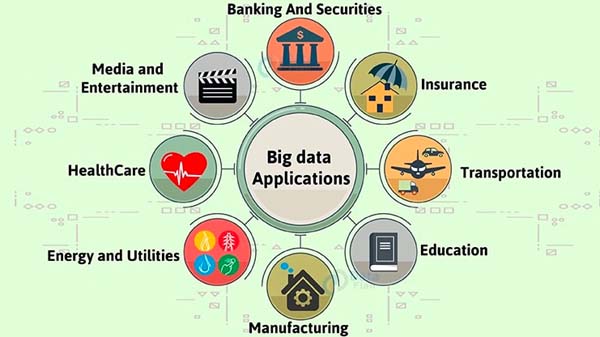Big Data Applications: Revolutionizing Industries – As we move towards a more digitalized world, the amount of data generated every day is growing exponentially. From social media platforms to online marketplaces, every aspect of our lives produces vast amounts of data that can be analyzed for insights.
This is where big data comes in – the ability to process, store, and analyze large amounts of data that traditional databases can’t handle. Big data applications are transforming industries by providing valuable insights into consumer behavior, predicting market trends, and identifying operational inefficiencies.
In this article, we’ll explore some of the most impactful big data applications across various sectors.

Healthcare Industry
The healthcare industry has always been data-driven, but with the advent of big data, it has become even more so. Big data applications in healthcare range from predicting disease outbreaks to personalized medicine. With the help of big data analytics, healthcare professionals can analyze patient data to predict disease patterns and develop effective treatment plans.
One of the most notable examples of big data application in healthcare is the “IBM Watson for Oncology” program. This program uses machine learning algorithms to analyze patient data and provide personalized treatment recommendations for cancer patients.
Finance Industry
The finance industry has also been transformed by big data applications. Banks and financial institutions use big data analytics to detect fraud, analyze consumer behavior, and manage risk. Big data is also used to identify investment opportunities and predict market trends.
One example of a big data application in finance is the use of predictive analytics to identify potential fraudulent transactions. By analyzing large amounts of data in real-time, banks can quickly identify suspicious transactions and prevent fraud.
Retail Industry
The retail industry has always been competitive, and big data applications are helping retailers gain a competitive edge. Big data analytics can be used to analyze customer behavior, predict trends, and improve supply chain efficiency.
One notable example of big data application in retail is Amazon’s recommendation system. Using machine learning algorithms, Amazon can analyze customer data to recommend products that they are likely to buy.
Manufacturing Industry
The manufacturing industry has also been revolutionized by big data applications. Big data analytics can be used to optimize production processes, reduce downtime, and improve product quality. By analyzing machine data in real-time, manufacturers can quickly identify operational inefficiencies and take corrective action.
One example of a big data application in manufacturing is General Electric’s “Brilliant Manufacturing” platform. This platform uses big data analytics to optimize production processes and improve product quality.
Transportation Industry
The transportation industry is another sector that has been transformed by big data applications. Big data analytics can be used to optimize routes, reduce fuel consumption, and improve safety. By analyzing real-time data from sensors and GPS devices, transportation companies can make data-driven decisions that improve efficiency and reduce costs.
One example of a big data application in transportation is the “SmartDrive” platform. This platform uses video-based analytics to improve driver safety and reduce fuel consumption.
Agriculture Industry
The agriculture industry is also being transformed by big data applications. Big data analytics can be used to optimize crop yields, reduce waste, and improve sustainability. By analyzing weather patterns, soil conditions, and crop data, farmers can make data-driven decisions that improve efficiency and reduce costs.
One example of a big data application in agriculture is the “Precision Agriculture” platform. This platform uses sensor data and machine learning algorithms to optimize crop yields and reduce waste.
Education Industry
The education industry is also starting to benefit from big data applications. Big data analytics can be used to personalize learning, identify at-risk students, and improve graduation rates. By analyzing student data, educators can make data-driven decisions that improve student outcomes.
One example of a big data application in education is the “Knewton” platform. This platform uses machine learning algorithms to personalize learning for each student by analyzing their performance data and adapting the content accordingly.
Entertainment Industry
The entertainment industry has always relied on data to make decisions about what content to produce, but big data applications have taken this to a new level.
By analyzing viewer data, entertainment companies can gain insights into audience preferences, predict the success of a new release, and even identify which scenes in a movie or TV show are most engaging.
One example of a big data application in entertainment is the Netflix recommendation system. Using machine learning algorithms, Netflix can analyze user data to recommend content that they are likely to enjoy.
Government Industry
Big data applications are also transforming the way governments operate. By analyzing large amounts of data, governments can make data-driven decisions about policy, improve public safety, and optimize resource allocation.
One example of a big data application in government is the “Data.gov” platform. This platform provides access to a wide range of government data, allowing researchers, policymakers, and citizens to make data-driven decisions.
Sports Industry
The sports industry has always been data-driven, but big data applications are taking this to a new level. By analyzing player data, coaches and teams can gain insights into player performance, predict injuries, and identify areas for improvement.
One example of a big data application in sports is the “SportVU” platform. This platform uses cameras to capture player movement data during games, allowing coaches and teams to analyze player performance in real-time.
Conclusion
Big data applications are transforming industries across the board by providing valuable insights into consumer behavior, predicting market trends, and identifying operational inefficiencies.
From healthcare to entertainment, big data is revolutionizing the way we do business. As the amount of data continues to grow, the possibilities for big data applications are endless.
Read More: